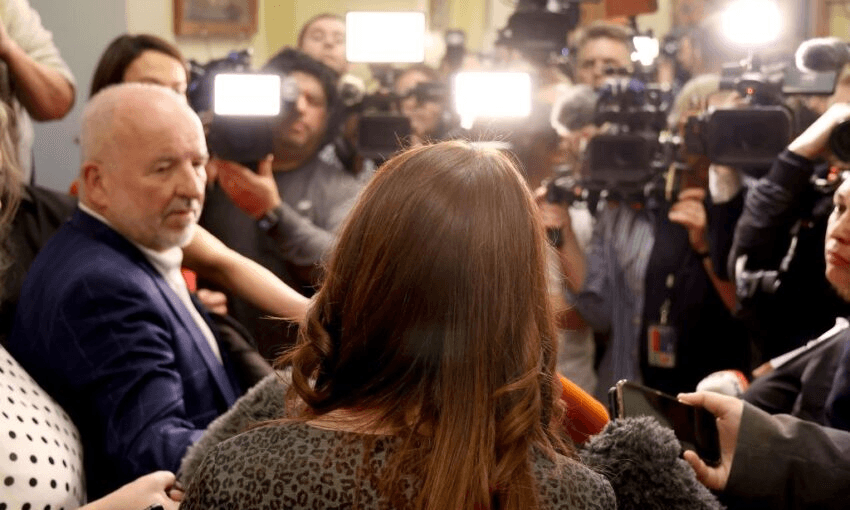The election is over and three of parliament’s parties have retreated behind closed doors, reports Justin Giovannetti.
Parliament has entered, on the surface at least, a post-election hibernation. The government is in caretaker mode, barred from making major decisions, while party leaders eager for attention just days ago now have nothing to say.
The coming days and weeks will tell what’s happening behind closed doors, as negotiations over the next government proceed and National grapples with the loss it has endured. With the leaders promising quiet, it will come out in grumbling, gossip or successful talks.
Labour and the Greens have agreed not to speak publicly while they discuss the shape of the future government, offering only a timetable for talks and a wall of blandness as conversations start in the Beehive.
Jacinda Ardern says she has a plan for the coming fortnight. By the end of next week she hopes to announce what kind of government the country will have for the next three years. The following week, in early November, she’ll announce the new cabinet and the government will be sworn in. Before that happens she’ll have little to say.
Does she want a coalition, a confidence and supply agreement, or something even milder? No comment.
“We do have a very clear mandate but, as I’ve said before, I’m interested in areas of cooperation where we can use the strengths that exist in their team for the benefit of the government and all New Zealand,” she said of ongoing talks with the Greens.
Constitutionally, Ardern can govern alone. MMP isn’t typically supposed to create majority governments but it has in this case, owing to the fact that Labour got about half the vote. The Germans after whom we modelled our electoral system have only had one majority, in 1957, with post-war statesman Konrad Adenauer at the absolute height of his popularity. There’s not much of a playbook for Ardern to follow.
There are also almost 500,000 special votes that are still uncounted. While those votes won’t upset the upcoming parliament in a significant way, Ardern and Labour are safe, the votes will likely change the final result somewhat.
The Greens hope to pick up an additional seat, going so far as to snap some photos of the incoming caucus on the steps of parliament yesterday with the number 11 candidate on their list, Steve Abel. He’ll only get a seat if the party performs very well in the special votes.
Green co-leader James Shaw says word he utters now is being dissected, so he’s going to be mum.
“You’re going to find this a very frustrating interview because we cannot comment on what’s going on in the negotiations until they are concluded, sorry. That probably answers most of your questions,” he said in reply to questions from journalists yesterday.
“We’re in that funny stage post-election where everybody is trying to read tea leaves and absolutely everything that everybody says. We just don’t have any comment on the nature of negotiations,” he added.
The National Party, only hours after one of its worst electoral defeats, says it’s ready to move on and forget Saturday’s loss. Judith Collins, facing reporters on Tuesday, said an internal review will look at what went wrong. Standing with her caucus behind her, Collins said any thoughts about the defeat will be shared internally, behind closed doors. There’s nothing she wants to tell the public.
Members of the National caucus were anonymously warning on Sunday that there would be “blood on the floor” when they met yesterday. Others spoke publicly about the defeat and mistakes that were made. Yesterday they were publicly quiet and Collins said any ill-will never showed up.
“I thought it was a very, very constructive caucus meeting,” she said, speaking in her party’s caucus room, where new MPs as well as defeated ones just met for four hours. Outgoing MPs were given a silver tray and a thank you. “Inspiring. Onwards and upwards for us,” said Collins of the meeting.
National will be the “very best opposition” now, Collins added. She said she expects she’ll still run the party in the 2023 election. Behind her stood former leaders Simon Bridges and Todd Muller. The latter cringed when reporters asked Collins whether his centrist coup that dethroned Bridges was a bad idea. Old news, retorted Collins.
Christopher Luxon, the former head of Air New Zealand and new National MP for Botany stood quietly as he was part of his first large media scrum in parliament. He’s said to have leadership hopes, but those weren’t on display yesterday.
Collins also shrugged at questions from reporters about the composition of her caucus, which is overwhelmingly white, male and old after the election. The party will look into that, in private, behind closed doors. However, two MPs who lost their electorate seats and happen to be white, male and old — Gerry Brownlee in Ilam and Nick Smith in Nelson — will stay on because of their high-ranking on the list, she confirmed.
Denise Lee, who wrote an email during the campaign that slammed Collins and was subsequently leaked to the media, said she had no comment. “All my comments will be reserved for our internal process. I support Judith as the leader. No more comments, thanks.”

